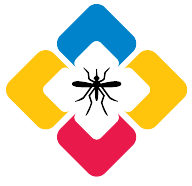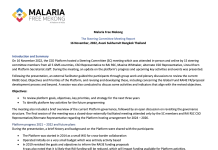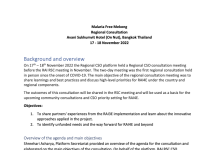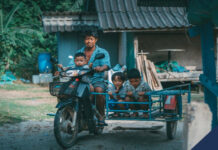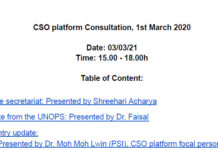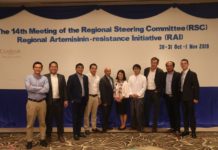

Highlighted, for the first time, CSOs from each country presenting their work contributed to the national program.
Country representatives presented their contribution following:

Cambodia,
Dr Sok Pun presented that , In Cambodia, CSOs and the National Malaria Program in good partnership with CNM, PHDs and ODs, HCs and Community Volunteers, Cambodia CSOs contribute to:
- 63% of bednets contributed, 100% of HC utilizing MIS for reporting
- 96-100% of Health Facilities without stockout RDTs and antimalarial drugs
- 1,056 staff trained on case management
Moreover, with close collaboration, CSOs and Government staff go to the last mile to access hard-to-reach populations, navigating bad roads, long distance, busy schedules, and completion priorities to support the National Strategic Plan for Elimination of malaria in the Kingdom of Cambodia, and the Strategy for Malaria Elimination in the Greater Mekong Subregion (GMS).

Lao PDR,
Dr Soulany Chansy a CSO country representative presented the data of CSOs working to support National program to end malaria from the country by 2030. The contribution of 30% (17344/58,460) of cases had been tested, of this contribution, 38% (680/1810) of positive cases were reported from CSOs.

Myanmar,
Dr Phone Si Hein presented a successful contribution to the national malaria program. 994,023 suspected malaria cases tested, 33,717 confirmed cases treated. Of this 33% of tests and found 55% of positive cases were done by CSOs.

Thailand,
Alistair Shaw, Thailand’s CSO representative presented – Thailand CSO contribution to the national program (2018) through three key strategies:
1. Community resilience:
– Conducted mapping of over 8500 households to support with tailoring activities to the needs and behaviours of the target population
– 11% of population sleep overnight in forests, 21% of the population travel to forests during the night.
– >4500 LLINs distributed,
– >62,000 people attending health education sessions
2. Worksite interventions:
– Conducted mapping of over 1000 worksites to support with tailoring activities to the needs and behaviours of the >13,000 employees
– Limited number of nets available at worksites (665 LLINs, 34 LLIHNs) for 13,000 employees
– Provided health education to 8,800 employees, who are >90% non-Thai
3. Cross-border collaboration:
– Facilitated border malaria corners (BMC) at formal and informal crossings which demonstrated the high demand for malaria information and testing with over 5 times the number of expected participants.
– Organised high level and operational meetings in Ranong, Ubon Ratchathani, Si Sa Ket and Prachuap Kiri Khan

Vietnam,
Dr Khuat Thi Hai Oanh showed, In Vietnam, 3 CSOs working in 4 provinces with the highest number of malaria cases to support and contribute national malaria program with 3 different approaches. 1)PSI: Private sectors, 2) HPA: Village health workers and 3) VietMCI: Community Malaria Action Team (CMAT).
CSOs main activities
• IEC: one-on-one, small group direct communication, billboard, promotion materials
• LLIHN distribution to forest goers and farm sleepers;
• Testing: administering rapid tests/assisted referral, village/private/public;
• Confirmed cases as result of CSO activities
• CSO speeding up: VietMCI assisted referred cases increased from 8% to 33% of total cases in project sites from the last quarter of 2018 to the first 2 months of 2019.
• Data gathering.
CSOs data gathering, the use of mobile phone technology following:-
– PSI: HNQIS for quality monitoring and DHIS for reporting;
– HPA-supported VHWs for reporting;
– VietMCI’s CMAT REDCap for mapping, monitoring, reporting, TA
